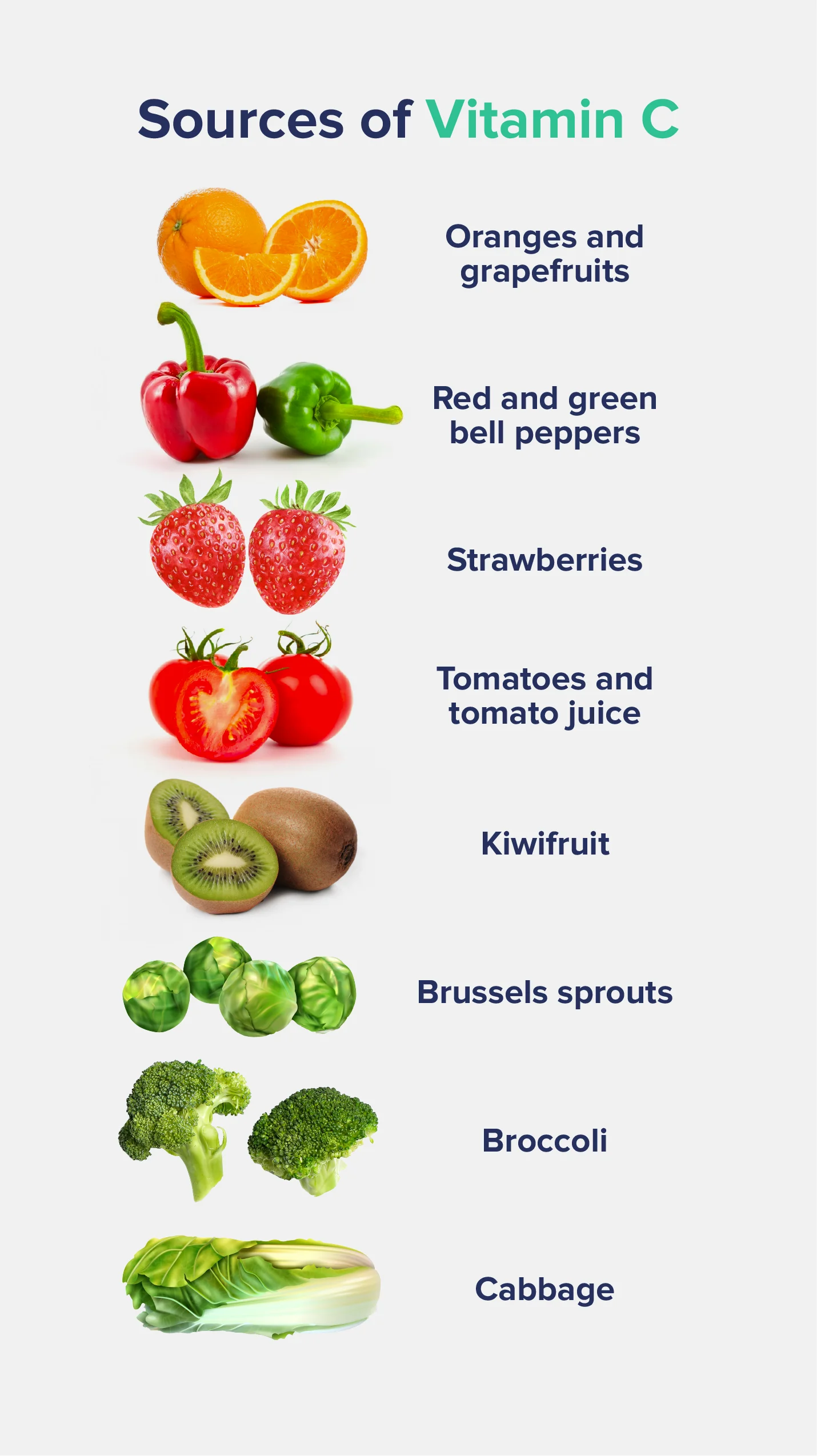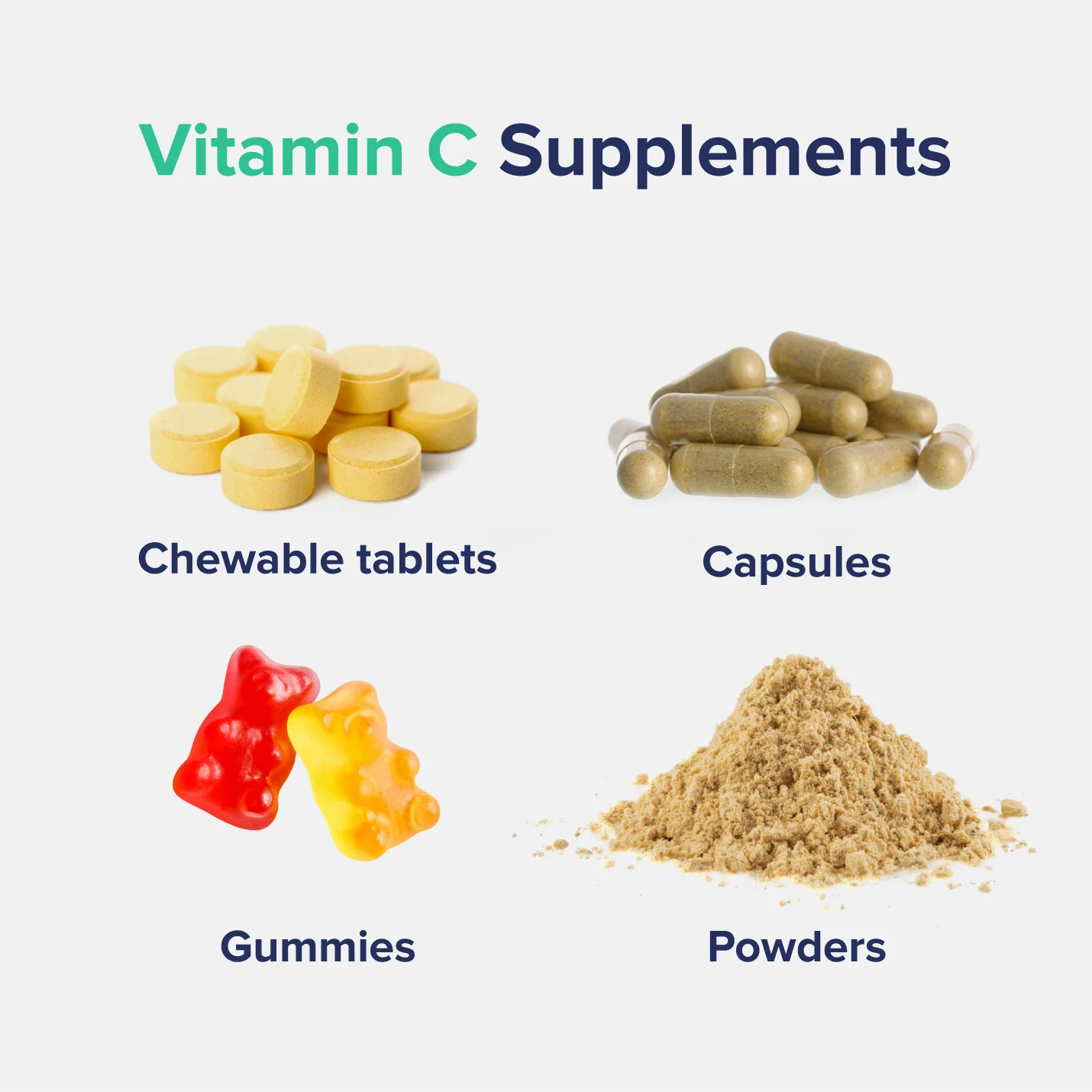Talk to a Registered Dietitian and use INSIDER20 for 20% off!
Talk to a real Dietitian for only $99: Schedule Now
This post contains links through which we may earn a small commission should you make a purchase from a brand. This in no way affects our ability to objectively critique the products and brands we review.
Evidence Based Research To fulfill our commitment to bringing our audience accurate and insightful content, our expert writers and medical reviewers rely on carefully curated research.
Read Our Editorial Policy
If you’re considering adding vitamin C (also called ascorbic acid) to your daily supplement lineup, you might be curious if there is a particular time when it is best to take.
Well, it depends on what you’re asking.
If you’re curious about the best time of day or when it might be necessary to take it to improve your health, we have different answers.
So, in this article, we’ll address each of these questions and give you our best advice on when to take vitamin C supplements to see the best results, along with a quick rundown of why you would even want to take vitamin C in the first place.
Simply put, there is no recommended time of day to take vitamin C that would optimize your intake or its effectiveness.
Unlike some supplements, such as melatonin and magnesium, which are recommended to take in the evening before bed since they have a calming or sleep-inducing effect, vitamin C doesn’t have quite the same impact on energy levels.
While it can improve sleep duration and quality and reduce fatigue, it’s not so noticeable that you should adjust the time you take it to the evening or morning.
What matters is how much you take and the frequency.
As vitamins go, vitamin C is a pretty safe supplement to take and rarely interacts or interferes with other medications, supplements, or foods when taken at the appropriate dosages; the same generally goes for vitamin-C-rich foods.
The only contraindication is that it can cause nausea or indigestion if taken on an empty stomach since it is an acid; especially when the vitamin C content of a food (or supplement dose) is high.
So, the best time for taking vitamin C is whenever you will remember to take it––whether that’s the morning, afternoon, or evening––preferably with a meal.
The only caveat is if you are also supplementing with vitamin B-12 since vitamin C can reduce the amount of B-12 available in your body.
As such, it is recommended to take vitamin C a few hours after you take your B-12 supplement.
Is there a good time of year to take vitamin C? This may seem like an odd question, but it is worth asking.
That’s because vitamin C plays a crucial role in the healthy functioning of our immune systems.
So, if you’re entering flu season or your kids are going back to school, it might be a good idea to start supplementing with some vitamin C to give your immune system a boost.
This is because vitamin C is essential for immune cell function and energizes white blood cells, enabling them to react more quickly to pathogens and illnesses.
This won’t prevent you from getting sick, but it can reduce the severity and duration of an illness.
If you eat a balanced diet, you should not need to supplement your vitamin C intake since you are likely getting your daily recommended intake from fresh fruits and vegetables.
However, there are plenty of contexts where vitamin supplement use makes sense.
For example, if you can’t get enough vitamin C in your diet and think you may be experiencing signs of a vitamin C deficiency, you might want to consider supplementing with vitamin C.
A vitamin C deficiency––also called scurvy––can cause poor wound healing, irritability, bleeding gums, dry skin and hair, and flu-like symptoms.
However, always speak with your doctor first since a vitamin C deficiency is usually tied to other underlying health problems.
You might also want to consider taking vitamin C if you are supplementing with iron or if you’re vegetarian or vegan.
Vitamin C can boost iron absorption from supplements and non-heme (plant-based) sources of iron, which is especially important for women as they are more susceptible to having low iron.
Vitamin C can also help naturally synthesize collagen, which is helpful for vegetarians and vegans who cannot get collagen from animal sources.
Getting enough vitamin C is vital for the healthy function of our immune systems and prevents illnesses like scurvy, but supplementing with it can also provide a host of benefits.
These benefits likely won’t be life-changing for most people, but they can slightly optimize our health and well-being in the long run.
Promotes healthy skin: When applied topically, vitamin C is a potent substance for treating age-related skin problems and can improve the skin’s texture, reduce the appearance of wrinkles, and fade hyperpigmentation from sun damage and scarring.
Boosts immune function: Vitamin C plays a vital role in the health of our immune cells, and supplementing with it may reduce the severity and duration of illnesses such as the common cold by energizing immune cells like leukocytes and T-cells.
Improves iron absorption: Getting enough iron is vital for producing healthy red blood cells, but some people (mainly women) can experience iron deficiency anemia. If you are supplementing with iron or are eating a diet low in heme (animal-based) sources of iron, you may benefit from supplementation with vitamin C since it can help with iron absorption. In other words, getting enough vitamin C is directly connected to getting enough iron.
Powerful antioxidant properties: Vitamin C is one of many powerful antioxidants. But why does this matter? Well, antioxidants are free radical scavengers, and free radicals can increase oxidative stress in our bodies, which leads to a host of problems, from inflammation to cancer. This is why antioxidants are so often mentioned in the nutrition world. Regularly consuming vitamin C in our diets (as opposed to just supplements) is one of the best ways to benefit from its antioxidant properties, from cancer treatment (adjunct) to much more.

Because vitamin C is a water-soluble vitamin, it dissolves easily in water and is absorbed into the body’s tissues, but it has a hard time staying stored there. This is why the body requires a steady supply of each water-soluble vitamin.
In addition to being unable to synthesize it within our bodies naturally, we have to consume more vitamin C every day in one of two ways: in our diet or with dietary supplements.
A healthy, balanced diet packed with vitamin C alongside other essential nutrients will always be the best and most effective way for the average person to achieve adequate intake on a daily basis.
However, there are valid reasons to supplement with this water-soluble vitamin in higher doses, such as if you are experiencing low iron or want to boost your immune function. High-dose supplements are a situational thing in the case of Vitamin C, mind you, and shouldn’t be maintained for most people (as always, consult your doctor to confirm an optimal dosage).
It is primarily found in vegetables and citrus fruits, but evidence suggests vitamin C is most abundant in:

While there are “drip bars” where you can receive intravenous vitamin C, oral vitamin C supplements are the safest and most common.
There are several different types you can take:
Look for vitamin C supplements that include bioflavonoids, another powerful antioxidant mainly found in citrus fruits that boost the immune system and may help with vitamin C absorption.
There is also liposomal vitamin C, an even more bioavailable form of this vitamin, which also comes in gels, powders, and capsules.
There is no recommended time of day for taking vitamin C since it neither impacts our energy levels or digestion nor is it absorbed better based on the time of day. The only caveat is that it is suggested to take with a meal since it is an acid that can cause nausea or indigestion on an empty stomach—especially in the high-dose vitamin C supplement scenario.
There is no particular reason to avoid taking vitamin C at night unless it has been a few hours since you ate. Taking vitamin C on an empty stomach can cause mild digestive problems.
You should not take a vitamin C supplement with a B-12 supplement as it can reduce the amount of available vitamin B-12 in the body. Take vitamin C a few hours after taking your vitamin B-12 supplements.
Per the Institute of Medicine Food and Nutrition Board, the dietary reference intakes for vitamin C for adults is 75 and 90mg daily for adult women and men, respectively. However, it is suggested that a dietary vitamin C intake between 100 to 200mg is more than safe for the average adult and can cause reduced risk of chronic diseases while supporting healthy immune function, among addressing other health risks. Given the high tolerability of vitamin-C-rich foods and supplements, appropriate doses cover a high range that can vary situationally. Appropriate doses vary depending on several factors.
The two forms of vitamin C supplements known to have better absorption and bioavailability than other common forms are liposomal vitamin C and vitamin C with bioflavonoids.